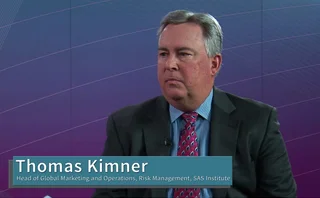
GSEs could endanger US credit rating
Exposure to government-sponsored enterprises (GSE) such as Fannie Mae and Freddie Mac could threaten the US government's AAA credit rating, New York-based rating agency Standard & Poor's has warned.
The GSEs are technically not part of the government - they are publicly listed companies with no explicit government guarantee, overseen by the Office of Federal Housing Enterprise Oversight (Ofheo). But, especially as the subprime crisis has worsened, the GSEs have been used to take up the slack in mortgage origination, and are widely seen to possess an implicit government guarantee.
Already this year Ofheo has announced it will permit the GSEs to invest a large portion of their 30% capital requirement surplus in mortgages and mortgage-backed securities. It has loosened their capital surplus requirements from 30% to 20% and raised the maximum size of mortgages they are allowed to buy. The changes should allow the firms to purchase or guarantee about $2 trillion of mortgages this year, Ofheo said.
Even before these changes took effect, their share of the mortgage securitisation market had already risen sharply, S&P analysts John Chambers and Nikola Swann said. "The GSE share of mortgage-backed securities origination reached 80% in January 2008, a significant increase from 46% in second-quarter 2007". Meanwhile, the GSE share of mortgage origination doubled from 38% in 2006 to 75.6% in 2007, Ofheo announced in February.
And this in turn has involved the GSEs in significantly more risk, said S&P analyst Victoria Wagner. "The GSEs are facing these higher demands for liquidity at a time when their own core mortgage performance is weaker, and there is a higher degree of uncertainty regarding the broader market conditions. The GSEs' liquidity role is expanding to a new segment of the mortgage markets – jumbo mortgages, which are typically in the nation's weakest housing markets in terms of negative trends in home prices. Although the window of business expansion into the jumbo mortgage market is limited, it comes at a time when the housing markets bring more risk, and the GSEs are facing a higher degree of financial stress."
The risk associated with bailing out struggling broker-dealers such as Bear Stearns is small by comparison, S&P estimates. "The amounts the Fed has extended to the broker-dealers are small... At less than 1% of gross domestic product (GDP), these amounts are immaterial to our view of the US government's credit quality. Moreover, these advances are collateralised. By broadening the scope of institutions for which it is the lender of last resort, the Fed has brought this segment of the sovereign's contingent liabilities a step closer to becoming direct liabilities, but the broker-dealers' small size makes the potential marginal impact insignificant," said its analysts.
But supporting the GSEs would entail much more significant risk - their portfolios of dubious mortgages could produce losses of up to 8% of GDP, and a deep recession could drive up government debt by 25% of GDP as the government becomes compelled to intervene to support GSEs and other financial sectors. This in turn would reduce the quality of US government debt.
See also: GSEs to increase liquidity in mortgage market
Freddie Mac to bolster capital requirements
Freddie Mac sells $6bn in stock to ward off capital fears
Capitol mortgage ideas
Only users who have a paid subscription or are part of a corporate subscription are able to print or copy content.
To access these options, along with all other subscription benefits, please contact info@risk.net or view our subscription options here: http://subscriptions.risk.net/subscribe
You are currently unable to print this content. Please contact info@risk.net to find out more.
You are currently unable to copy this content. Please contact info@risk.net to find out more.
Copyright Infopro Digital Limited. All rights reserved.
As outlined in our terms and conditions, https://www.infopro-digital.com/terms-and-conditions/subscriptions/ (point 2.4), printing is limited to a single copy.
If you would like to purchase additional rights please email info@risk.net
Copyright Infopro Digital Limited. All rights reserved.
You may share this content using our article tools. As outlined in our terms and conditions, https://www.infopro-digital.com/terms-and-conditions/subscriptions/ (clause 2.4), an Authorised User may only make one copy of the materials for their own personal use. You must also comply with the restrictions in clause 2.5.
If you would like to purchase additional rights please email info@risk.net
More on Infrastructure
Communications surveillance solutions 2024: market update
A report offering Chartis’ latest view of the vendor landscape for communications surveillance solutions
SIMONE, the AI that nearly took down a bank
An algorithm designed to create new structured products ran out of control last year with almost catastrophic consequences for a major bank, as our exclusive whistleblower account reveals
Revealed: where banks are (literally) warehousing their swaps
As derivatives notional grows, dealers experiment with novel storage solutions
E-trading takes hold for FX swaps – sort of
Bulk of trades are being executed over screen, but bolder changes have stalled
From DNA to DHA – Preparing for a new era of digital human augmentation
As technology increasingly permeates societies, cultures and everyday activities, its integration into people’s lives is having a profound impact on what is expected of people in the workplace. Deloitte examines this evolution of today’s workforce, the…
Risk and finance: Working more closely together
Video interview: Thomas Kimner, SAS
Video interview: Fabio Merlino, Intesa Sanpaolo
Fabio Merlino, head of retail and insurance risk discusses how the wealth management division of Intesa Sanpaolo upgraded its risk analytics capabilities with the algo system used by its proprietary traders
The changing face of Risk.net and our magazines
Extensive reader consultation has helped us reshape editorial teams and our site







